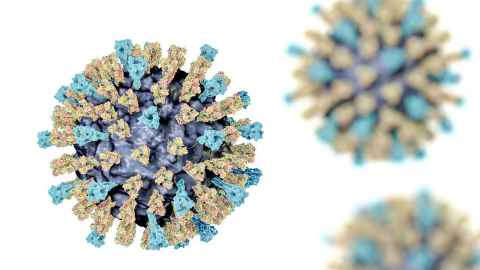Freedom of choice puts babies at risk
13 March 2019
Opinion: We have a measles outbreak. People who’ve chosen not to vaccinate could put babies at risk – they must act responsibly and stay home, writes Theo Brandt.

Measles is back again. But hold on, you say – didn’t we eliminate measles from New Zealand, like, years ago? Well, yes and no.
The challenge with this extremely infectious disease is that while it may no longer lurk within New Zealand, it is always just a plane ride away. The spike in infections we are currently experiencing is caused by just that – a returning local or visitor with measles.
And unfortunately, measles is a superstar of viruses, with an R0 factor of 12 to 18. This means one person with measles will infect, on average, another 12 to 18 unvaccinated people.
Do not believe those who say it is a mild childhood disease or rite of passage. Measles can make you extremely ill. It can also kill you. It is quite unpredictable who will suffer most. Roald Dahl’s daughter died of measles encephalitis in 1962. Bed ridden and miserable one morning and feeling sleepy; unconscious within one hour and dead within 12. And while medical care may well have advanced in the intervening 56 years, this can still happen: there is no cure for measles.
There is of course prevention. The MMR vaccine. We all must know by now that the MMR vaccine cannot cause autism, but this scare of the 1990s is partly responsible for the predicament we find ourselves in now.
It must be made very, very clear that if you choose to not immunise, or not immunise your children, then you have a very serious responsibility to keep yourselves and the community safe.
In Canterbury, where they have 23 cases of measles and climbing, the range of ages is like observing the strata of geological markers showing the effect of our variable immunisation rate over the decades. A bunch of 20-somethings missed all MMR vaccines as children due to the misinformation spread at the time. Others of a slightly older age may have only had one dose giving them a good level of protection, but not as good as the two doses received nowadays. And then we see the group of those aged in months, not years. They are too young to be fully immunised and suffer because of the inaction of others. If we don’t get a good 95 percent of our community protected through vaccination, our most vulnerable, who cannot choose to be immunised, remain at risk.
We still do have a choice to make in New Zealand – to vaccinate or not. It must be made very, very clear that if you choose to not immunise, or not immunise your children, then you have a very serious responsibility to keep yourselves and the community safe. This is because you create the perfect vessel to aid the spread of preventable diseases.
You may not believe in the seriousness of measles, but most do, and they do not want to take the risk. For these reasons, isolation, not just from school, but from sports, shopping, cinemas – any gatherings of people in fact – is essential. This is not a philosophical debate about personal freedom, this is a vital step to stop the spread of a potentially deadly disease.
It is everyone’s personal freedom to make that choice – but we can’t choose to protect our toddlers from measles until they’re 12 months old. So everyone who chooses to remain unvaccinated at the time of an outbreak like this has to be respectful of everyone’s choices and may be asked to stay at home.
On the other hand, you could just have two doses of MMR vaccine, in New Zealand you can still catch up at any time, and it’s free.
Theo Brandt is from the Immunisation Advisory Centre based at The University of Auckland. This article reflects the opinion of the author and not the views of the University of Auckland.
Used with permission from Newsroom Freedom of choice puts babies at risk published on 13 March 2019.